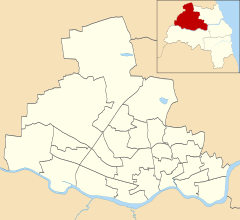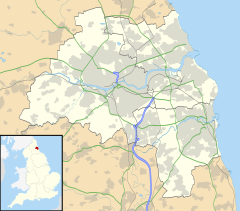Byker Metro station
Byker | |||||||||||
|---|---|---|---|---|---|---|---|---|---|---|---|
| Tyne and Wear Metro station | |||||||||||
 | |||||||||||
| General information | |||||||||||
| Location | Byker, Newcastle upon Tyne England | ||||||||||
| Coordinates | 54°58′34″N 1°34′49″W / 54.9760388°N 1.5803440°W | ||||||||||
| Grid reference | NZ279637 | ||||||||||
| Transit authority | Tyne and Wear PTE | ||||||||||
| Platforms | 2 | ||||||||||
| Tracks | 2 | ||||||||||
| Construction | |||||||||||
| Bicycle facilities | 3 Sheffield stands | ||||||||||
| Accessible | Step-free access to platform | ||||||||||
| Other information | |||||||||||
| Station code | BYK | ||||||||||
| Fare zone | A | ||||||||||
| History | |||||||||||
| Original company | Tyne and Wear Metro | ||||||||||
| Key dates | |||||||||||
| 14 November 1982 | Opened | ||||||||||
| Passengers | |||||||||||
| 2017/18 | 0.32 million[1] | ||||||||||
| Services | |||||||||||
| |||||||||||
| |||||||||||
Byker is a Tyne and Wear Metro station, serving the suburb of Byker, Newcastle upon Tyne in Tyne and Wear, England. It joined the network on 14 November 1982, following the opening of the fourth phase of the network, between Tynemouth and St James via Wallsend.
History
Prior to the construction of the Tyne and Wear Metro, there was a British Rail station at Byker, which was located to the north of Shields Road. The station closed to passengers in 1954, with the remainder of the Riverside Branch closing to passengers in July 1973.[2]
Heading west from the station, the route crosses the 815 m (2,674 ft) Byker Viaduct over the Ouseburn Valley, then running alongside the East Coast Main Line, before heading underground, to Manors. The S-shaped viaduct was constructed for the Tyne and Wear Metro by Ove Arup, with work on the structure commencing in 1976, with completion in 1979.[3][4]
In 2021, a montage was added with works from the Baltic Centre for Contemporary Art.[5]
Facilities
Step-free access is available at all stations across the Tyne and Wear Metro network, with ramps providing step-free access to platforms at Byker. The station is equipped with ticket machines, a sheltered waiting area, seating, next train information displays, timetable posters, and an emergency help point on both platforms. Ticket machines are able to accept payment with credit and debit card (including contactless payment), notes and coins.[6][7] The station is fitted with automatic ticket barriers, which were installed at 13 stations across the network during the early 2010s, as well as smartcard validators, which feature at all stations.[8][9]
There is no dedicated car parking available at the station. There is the provision for cycle parking, with three cycle racks available for use.[10]
Services
As of April 2021[update], the station is served by up to five trains per hour on weekdays and Saturday, and up to four trains per hour during the evening and on Sunday.[11]
Rolling stock used: Class 599 Metrocar
References
- ^ "Tyne and Wear Metro usage figures 2017–18". 6 November 2018. Retrieved 21 August 2019.
- ^ "Byker Station". Disused Stations. Retrieved 23 March 2020.
- ^ Smyth, W. (December 1977). "Byker Viaduct" (PDF). The Arup Journal. 12 (4): 24–27.
- ^ Morton, David (24 February 2017). "Bridging the gap at Byker: How Metro, road and rail crosses the Ouseburn Valley". ChronicleLive. Retrieved 22 March 2020.
- ^ Holden, Alan (27 June 2021). "Byker Metro station hosts artwork from BALTIC". RailAdvent. Archived from the original on 27 June 2021. Retrieved 29 June 2021.
- ^ "Metro passengers feel the benefit of contactless payment". Nexus. 13 January 2014. Retrieved 24 May 2020.
- ^ "Revamp for Metro ticket machines". BBC News. 11 December 2011. Retrieved 24 May 2020.
- ^ "City Metro stations get new smart ticket machines and gates". Nexus. 22 October 2012. Retrieved 24 May 2020.
- ^ "Pop card validators at Metro stations are put through their paces". Nexus. 21 March 2013. Retrieved 24 May 2020.
- ^ "Timetables and stations: Byker". Nexus. Retrieved 24 May 2020.
- ^ "Timetables and stations: Byker". Tyne and Wear Passenger Transport Executive. Archived from the original on 23 March 2020. Retrieved 30 March 2021.
External links
 Media related to Byker Metro station at Wikimedia Commons
Media related to Byker Metro station at Wikimedia Commons- Timetable and station information for Byker

